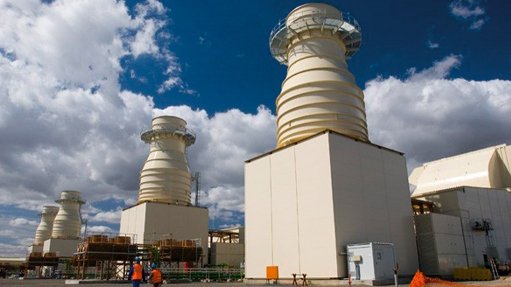
The Ankerlig OCGT plant
Organised business has called on government to fund adequate and reliable diesel supply for the country’s national peaking generators, which it describes as critical to ensuring that Eskom can best manage a stable grid and mitigate a further escalation in loadshedding levels.
In a joint business statement on loadshedding, the Energy Council of South Africa, Business Unity South Africa and Business Leadership South Africa said that, while they recognise diesel generation to be a short-term measure, it was nevertheless “an important bridge for the ongoing maintenance work and unplanned outages over the next six months”.
In a separate statement the National Treasury indicated that “Eskom did not apply for funding through the budget process and Eskom management should therefore take all necessary steps to ensure they secure the diesel needed to avert severe loadshedding”.
However, the National Treasury added that it was acutely aware of the impact that Eskom’s diesel shortages may have on already severe levels of loadshedding.
“For that reason, the National Treasury will continue with the engagements with the Department of Public Enterprises and Eskom aimed at identifying solutions to this matter.”
Eskom confirmed in mid-November that it had depleted its diesel budget for the 2022/23 financial year, which runs until March 31, having spent more than R12-billion between April and November against an initial budget for the year of R6.1-billion.
It also warned that the risk of loadshedding would increase in the coming month as it took down Koeberg Unit 1 for extended maintenance of up to 200 days, and as a result of a chimney duct failure at the Kusile power station that would take several months to repair.
While Eskom decided to postpone the start of the Koeberg shutdown, which was initially scheduled for December 8, it intends to proceed on December 10, which implies that loadshedding will been increased by a stage every time it is implemented over the coming year, as Unit 2 will enter into extended maintenance soon after Unit 1 is returned to service.
Organised business expressed deep concern about the current elevated status of loadshedding, which was not only “hugely detrimental to our economy and all citizens”, but also posed a major safety and security risk to business, infrastructure and household assets.
Nevertheless it expressed support for Eskom leadership and staff and called for “calm and well-executed actions”, while encouraging business, labour and civil society to help wherever possible by reducing electricity demand.
The statement stands in stark contrast to those made by Mineral Resources and Energy Minister Gwede Mantashe, who argued that “Eskom, by not attending to loadshedding, is actively agitating for the overthrow of the State”, adding that “loadshedding is becoming worse than State Capture”.
Business, meanwhile, encouraged Eskom to take all the necessary steps to mitigate a further deepening of the crisis and said it would continue to support the electricity crisis plan and be proactive in resolving the electricity crisis.
“South Africa will end loadshedding through collaboration and working together to achieve a sustainable and reliable electricity system.”